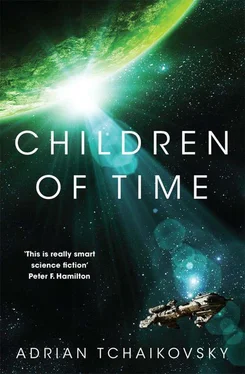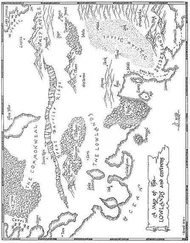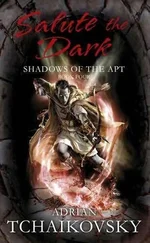‘What happened?’ he demanded, the question aimed more at the universe than anyone in particular.
‘Glad you asked.’ Scoles pushed into the room, virtually elbowing the gunman out to give himself space. ‘What was it you said, when we hauled you out of bed? “I don’t want to go,” was it? Well, join the club. Nobody here signed on for this journey to end up freezing in some death-trap on a moon without an atmosphere.’
Holsten stared at him for a moment, noticing the lean man’s long hands clenching, seeing the skin round his eyes and mouth twitch involuntarily – he guessed it was the mark of some drug or other that had been keeping the man awake and going since who knew how long. Scoles himself held no gun, but here was a dangerous, volatile man who had been pushed about as far as he could go.
‘Ah, sir…’ Holsten began, as calmly as he could manage. ‘You probably know that I’m Holsten Mason, classicist. I’m not sure if you actually wanted me, or if you were just after whoever you could get for… for a hostage, or… I don’t really know what’s going on here. If there’s anything… any way that I—’
‘Can get out with your skin intact?’ Scoles interjected.
‘Well, yes…’
‘Not up to me,’ the man replied dismissively, seeming about to turn away, but then he refocused and looked at Holsten again as if with fresh eyes. ‘Fine, last time you were about, things were different. But, believe me, you do know things – very valuable things. And I appreciate you’re not to blame, old man, but there are lives at stake here, hundreds of lives. You’re in this, like it or not.’
Not , decided Holsten grimly, but what could he say?
‘Signal the comms room,’ Scoles ordered, and the woman twisted her way over to one of the consoles, virtually sitting on Holsten’s shoulder as she sent the commands.
A long moment later, Guyen’s louring face appeared on the wall screen, glaring thunderously at all and sundry. He, too, looked older to Holsten’s eyes, and even more lacking in human kindness.
‘I take it you’re not about to lay down your arms,’ the Gilgamesh ’s commander snapped.
‘You take it right,’ Scoles replied levelly. ‘However, there’s a friend of yours here. Perhaps you want to renew your acquaintance.’ He prodded Holsten in the head to make his point.
Guyen remained impassive, narrow-eyed. ‘What of it?’ There was no real clue that he recognized Holsten at all.
‘I know you need him. I know where you’re intending to jaunt off to, once you’ve consigned us all to that wasteland,’ Scoles told him. ‘I know you’ll need your vaunted classicist when you find all that old tech you’re so sure of. And don’t bother searching the cargo manifests,’ this was said with bitter emphasis, by a man who until recently had been merely a part of that cargo, ‘because Nessel here is the next best thing – not an expert like your old man, but she knows more than anyone else.’ He clapped the woman beside him on the shoulder. ‘So let’s talk, Guyen. Or else I wouldn’t give much for your classicist and your chief engineer’s chances.’
Guyen regarded him – all of them – without expression. ‘Engineer Lain’s team is quite capable of covering for her, in her absence,’ he said, as though she had simply gone down with some transient infection. ‘As for the other, we have the codes now to activate the Empire installations. The science team can handle it. I will not negotiate with those who defy my authority.’
His face vanished, but Scoles stared at the empty screen for a long time afterwards, hands clenched into fists.
Generations have passed this green world by, in hope, in discovery, in fear, in failure. A future long foreseen is coming to pass.
Another Portia from the Great Nest by the Western Ocean, but a warrior this time, in the manner of her kind.
Her surroundings right now are not Great Nest but a different metropolis of the spiders: one she thinks of as Seven Trees. Portia is here as an observer, and to lend what aid she might. All around her, the community is a hive of furious activity as the inhabitants scurry and leap and abseil about their frantic business, and she watches them, her scatter of eyes taking in the chaos on all sides, and compares the sight to a disturbed ant’s nest. She is capable of the bitter reflection that circumstances have now dragged her people down to the level of their enemy.
She feels fear, a building anxiety that makes her stamp her feet and twitch her palps. Her people are more suited to offence than defence, but they have been unable to retain the initiative in this conflict. She will have to improvise. There is no plan for what comes next.
She may die, and her eyes look into that abyss and feed her with a terror of extinction, of un-being, that is perhaps the legacy of all life.
There are signals being flagged by messengers and lookouts posted high in the trees above, as high up as Seven Trees’ silk scaffolding extends. They signal regularly. The signal is time counting down: how long this place now has left before the enemy comes. The message wires that are strung between the trunks and their multitude of spun dwellings thrum with speech, as though the community is raging against the inevitability of its destruction.
Neither Portia’s death nor Seven Trees’ destruction is inevitable. The community has its own defenders – for in this time, in this age, every spider conurbation has dedicated fighters who spend their time training for nothing other than to fight – and Portia is here along with a dozen from Great Nest, in support of their kin. They wear armour of wood and silk, and they have their slingshots. They are the diminutive knights of their world, facing an enemy that outnumbers them by hundreds to one.
Portia knows she needs to calm herself, but the agitation within her is too great to be suppressed. She needs some external reassurance.
At the high point of the nest’s central tree she finds it. Here is an expansive tent of silk whose walls are woven with complex geometric patterns, the crossing threads drawn out according to an exacting plan. Another handful of her kind are already there, seeking the reassurance of the numinous, the certainty that there is something more to the world than their senses can readily grasp; that there is a greater Understanding. That, even when all is lost, all need not be lost.
Portia crouches down with them and begins to spin, forming knots of thread that make a language out of numbers, a holy text that is written anew whenever one of her people kneels in contemplation, and that is then consumed when they arise. She was born with this Understanding, but she has learned it anew as well, coming to Temple at an early age just as she has come here now. The innate, virus-hardwired Understanding of these mathematical transformations that she inherited did not inspire her in the same way as being guided through the sequences by her teachers, slowly coming to the revelation that what these apparently arbitrary strings of figures described was something beyond mere invention – was a self-evident and internally consistent universal truth.
Of course in Great Nest, her home, they have a crystal that speaks these truths in its own ineffable way – just as most of the greatest nests have now, that pilgrims from lesser communities often journey great distances to see. She has watched as the votive priestess touches the crystal with her metal probe, feeling the pulsing of the message from the heavens, dancing out that celestial arithmetic for the benefit of the congregation. At such times, Portia knows, the Messenger itself would be in the skies overhead, going about her constant journey – whether at night and visible, or hidden by the brightness of the daytime sky.
Читать дальше












